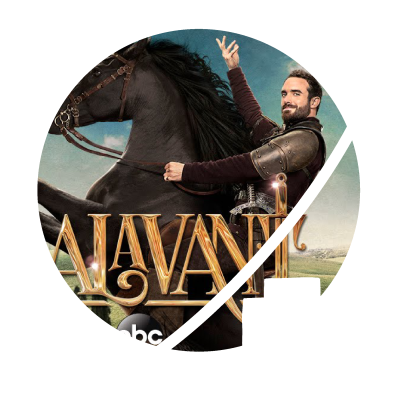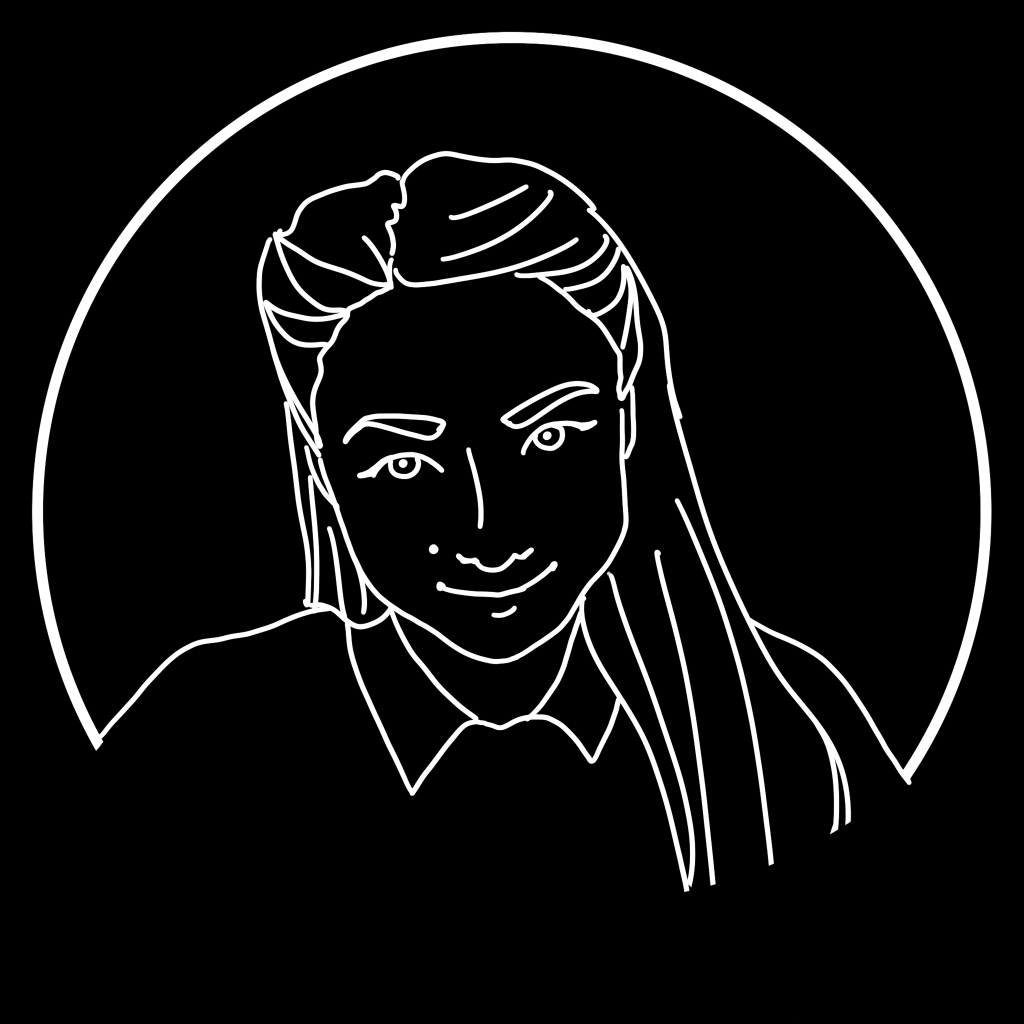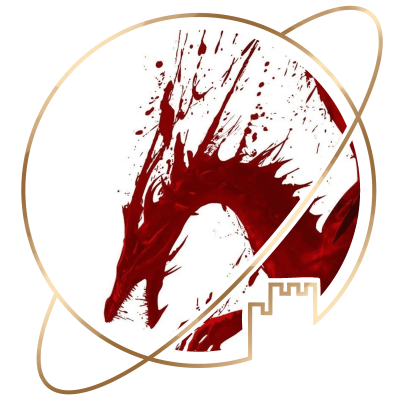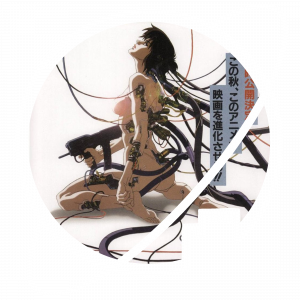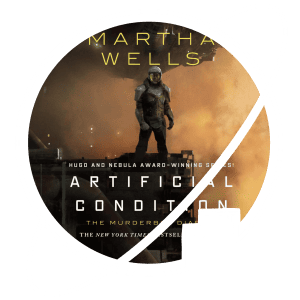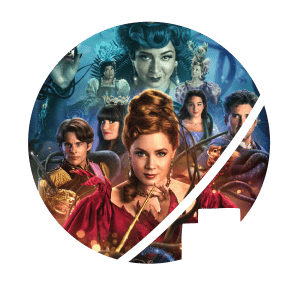Welcome to the Escape Velocity Collection!
We are an opinionated group of friends reviewing all sorts of fantasy and science fiction media. Don’t forget to get to know the curators and visit our curated Collection, where we discuss the stories that never cease to transport us to another world.
Will you escape with us?
LATEST POSTS:
Reviewed by:
- Video game developed by Wormwood Studios
- Directed by Mark Yohalem
- Published by Wadjet Eye Games
- Released 25 May 2021
- Point-and-click adventure
- Platforms: Microsoft Windows, Linux, MacOS
- Playing time: 6-8 hours
In this point-and-click video game by Wormwood Studios, the developers behind the brilliant Primordia, you’ll find yourself trapped on a floating festival ground in a madness-inducing cycle of death, desperation and poor jokes, chasing a golden-haired woman through a creepy world of croaking ravens and hollow laughter, running away from a dark thing that lashes out and kills you without the least provocation. Can you keep your wits together long enough to find out what is going on, and who you are?
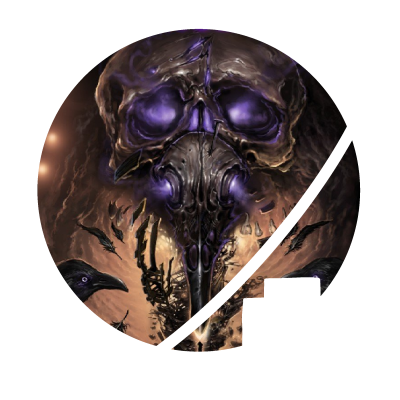

Strangeland by Wormwood Studios, the developers of the brilliant Primordia, is in the unenviable position of succeeding one of my favourite video game experiences ever. I’m going to admit right of the gate that it didn’t quite live up to that expectation; but then, Primordia was exceptional and I am not sure if any game could have.
Having said that, Strangeland is a great point-and-click adventure, that, like Primordia, has a very distinctive art style and soundscape that make for a very atmospheric experience. Where Primordia went with a post-apocalyptic wasteland, Stangeland goes for an occult horror vibe of bodiless fortune-tellers and eyeless scribes, talking ravens and people in straightjackets. I understand that the creepy carnival-style horror is not for everyone, but for some reason I love that trope. Especially when mixed with various references to Poe and Norse mythology (and probably all kinds of things that I missed), it made me feel right at home.
The gameplay is what you’d expect from a point-and-click adventure, with an avatar moving through several screens looking for objects to solve logical (and sometimes: less logical) puzzles, going back and forth between the various NPCs to convince them to help his struggle to defeat the ‘dark thing’ stalking the carnival grounds suspended in nothingness. An interesting element in the game is that you’re not set back when you die (the only penalty is having to sit through a poor joke told by a depressed clown) – and you even need to die to progress sometimes. Another thing I really like is that you can always walk up to the payphone and call a literal help line, which will tell you off for being an idiot and give you a hint for the next puzzle. Because the hints are built into the gameplay like that, it feels a lot less like cheating, and a lot more like the developers intended. In the end, we only ended up needing hints once, when we got stuck because there was one screen we had overlooked (a small hint to all you prospective players: there are four exits to the main tent – yes, that shadow on the right is also a tent flap). In the end I thought the puzzles were very fair, and sometimes there are several different solutions, which always helps.
I ended up feeling a bit let down by the ending, where you get to make some choices, but since they are so late in the game, they feel a bit shallow. One other reason was that the main character is very much intended to represent you, so (strangely?) I found there was less of an emotional impact compared to the struggles of lovable characters like Horatio and Crispin in Primordia.
Overall, I think that Strangeland is definitely a recommendation for people who love point-and-click games, people looking for a horror game without jump scares, or people who loved Primordia and want more – though in almost any event, I would recommend you check out Primordia first. Like with any point-and click game, I would recommend playing in short bursts or with someone else though, because more creativity is better and the last thing you want is frustration boiling over because you’ve been breaking your teeth on a problem that turns out to have a simple solution you missed.
See also:
Tagged:
- TV series created by Will Davies for Netflix
- Based on the book by Tonke Dragt
- Starring Amir Wilson, Ruby Ashbourne Serkis, Thaddea Graham, Gijs Blom
- First Aired on March 20th 2020
- 1 season
Young squire Tiuri has difficulties living up to his father’s name when it comes to the virtues required for knighthood. One night, his greatest challenge yet presents itself with a call for aid that sends him on a dangerous mission to deliver a secret letter to the king of a neighboring country. Why are people hunting this letter? And what is the significance of Tiuri’s own ancestry?
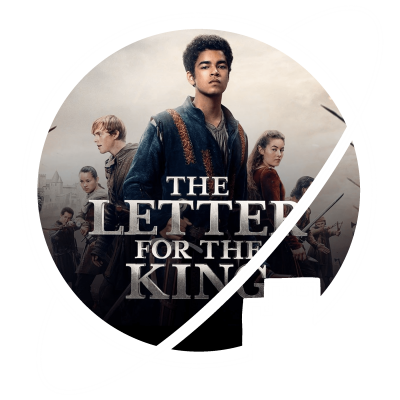

Are you wondering whether you should try this series? Please do not click the play button. You will regret it. I can be easily impressed by book-to-screen adaptations, but this version is absolute garbage. When Jop and I were watching the episodes, we used to joke that the best actor in the entire cast played Ardanwen, the horse. There suddenly is magic in my knight’s tale and Piak the charming mountain boy has been reduced to a silly brat. I did not enjoy one minute of this and I am very sad that Tonke Dragt is still alive to see this adaptation. Just read the book. Please, just read the book.

(This review relates only to the first (and hopefully last) season of this show)
Netflix’s The Letter for the King is the perfect example of how to butcher a carefully crafted story through tragically misunderstanding what a fantasy story should entail. And I hate it.
Some of my bitterness with this adaption might be attributed to my childhood passion for the source material (the book written by Tonke Dragt), but the unfortunate truth is that I started watching this series with very few expectations. In fact, I was curious to see how Netflix would improve on some of the areas the original story lacked, such as the inclusion of POC’s and female characters. Truth be told, Netflix’s version delivered in that regard, but failed miserably on everything else.
One of The Letter for the King‘s major problems is the fact that the creators tried to unite elements of The Lord of the Rings and A Game of Thrones within a children’s story that absolutely did not need such grandscale embellishments, because it thrived on subtle heroics. The inclusion of magic does not necessarily make for a better story. Similary, the inclusion of grim moralities does not necessarily make for a better story. If you still choose to include such things, you should do this with care, not simply because you aim to tick some boxes from the ‘fantasy check list’.
Which brings me to one of the other main issues; the writing for this series is just not good. Jasmijn and I used to joke Ardanwen the horse was the best actor in this series, but that’s only because that horse didn’t have to deal with a weak script. The child actors (Amir Wilson, Thaddea Graham and Ruby Ashbourne Serkis, specifically) actually showed much of promise. Similary, there were a few great/proven names (such as David Wenham, Andy Serkis, and Kim Bodnia) that I know to be good actors, but who could just not sell whatever the writers wanted to convey. That’s just a shame.
I wish I could leave you with some positive remark, but nope. This series was just not for me.
See also:
Tagged:

- Collected on:
- Books written by J. K. Rowling
- Published in 1997
- It's the entire 7 part Harry Potter series!
Do these books even need an introduction? They are the famous story of an eleven-year-old orphan who finds out he is a wizard and becomes a student at Hogwarts School of Witchcraft and Wizardry. Seven books filled with exciting adventures await…
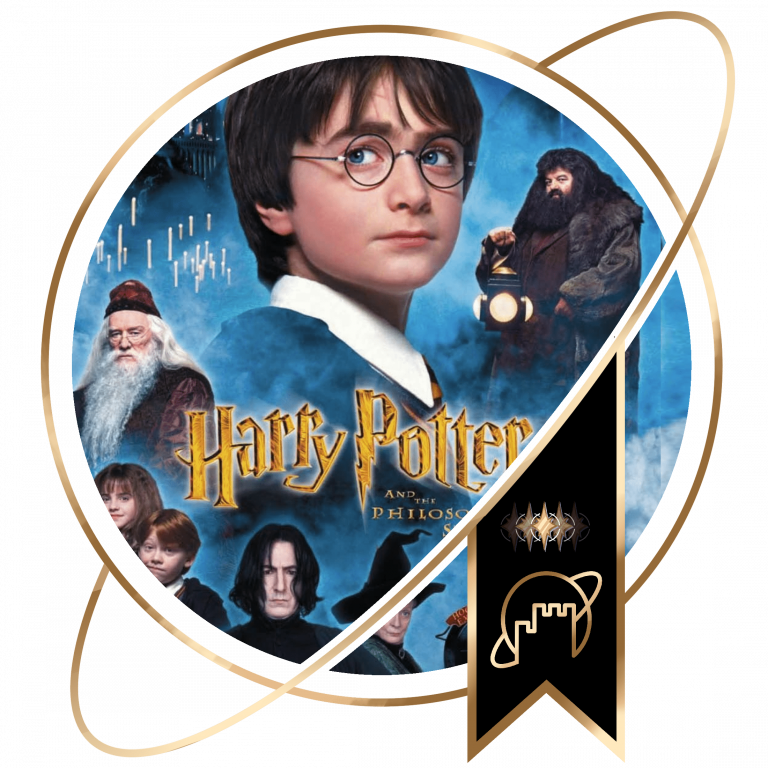
Peter: Welcome to this spoiler-free discussion J.K. Rowling’s Harry Potter series, which we’ve decided to add to the Escape Velocity Collection, a series of items that we believe represent the absolute peak of what the speculative genre has to offer.
There are some pieces of media which everyone knows, and which have been so influential that the Collection just isn’t complete without them. The Harry Potter series is one of them. Below, our curators discuss what Harry Potter has meant to them.

Robin

Key

Jasmijn

Peter

Lotte

Jop
My dad read all Harry Potter books to my sister and me (even though by the latest installments we really were a bit too old for that), and it is through the lens of that experience – of my father reading the books to us – that I still view the books. It’s also why I enjoyed the first four so much more than the three that followed – the books got longer as the series progressed, and less suited for the pace of a dad reading twenty minutes every night. It might also be that the books got darker and Harry got moodier towards the end, and I felt like that kind of heavy subject matter suited Rowlings’ style a little less.
Having said that, as nonsensical as the worldbuilding sometimes was, Rowlings’ whimsical creations did really spark my imagination. The Wizarding World is full of fun scenes, brilliant ideas, interesting characters, and believable emotional drama.
In conclusion, I like Harry Potter, and if you haven’t read the series yet – all I can say is, you’re missing out on a phenomenon. On the scale of Potter fans, however, I’m really nowhere near the top.


Harry Potter was a huge part of my childhood, and together with the Lord of the Rings it’s what got me into fantasy in the first place. Just like Peter, my father read the first book to me and my sister, but after that I read the second, third and fourth books on my own. And then the waiting started for the release of (the Dutch translation of) the fifth book. It was such a hype back then, I remember reading newspaper articles in the weeks leading up to the release speculating what would happen in the final books. It’s hard to imagine such collective excitement about a single piece of media these days, and I really miss it. Sometimes I wish I could be that little girl again for just a moment, full of excitement while standing in line before a bookshop in the middle of the night for the release of the next of her favourite books.
Of course, these days my feelings about Harry Potter are a lot more conflicted than they were back then, mostly for the reasons that we will get into below. But however I now feel about its author, it is impossible to deny the impact that Harry Potter has had on me. Even all these years later, it is still an incredible story with characters whom I consider to be beloved old friends.
I was a bit late to the Harry Potter party. Others grew up with the books, I had heard about the franchise, but my parents steered me away from any media containing magic when I was young. However, I was very interested in the books, and when I discovered them in our High School library I smuggled them home one by one to be read under the covers until dawn. I finished the entire series within a month. Pros: I was completely submerged in this fantasy world. Cons: I still couldn’t tell you the timeline of events. All the stories are one big blob in my brain. But it’s a blob of stories I treasure. With my little twelve-year-old act of rebellion I got to experience all the adventures of these well known characters. And I felt a lot more mature after that. I never quite felt connected to the books in the same way some other curators do, simply because my experience lasted a month, instead of years. However, seeing Harry, Ron and Hermione grow up together gave me some comfort and courage in a time when growing up felt scary and strange.


Like many others, I devoured the Harry Potter books when I was younger. I’ve even reread them multiple times. A magic school, high school drama and (murder) mysteries; it was an excellent recipe for an intriguing read.
Nowadays, however, I’ve come to learn there are many other books out there that are much better suited to my tastes. Though I agree that the Harry Potter books have justly made a huge impact on the fantasy genre and therefore deserve a place in the Collection, they are not among the best written books I’ve read.
How to sum up a childhood in two words: Harry Potter. No further comment.
Never mind, I can’t help myself. I think Harry Potter is at the core of my family relationships. From the second book onwards, my mother read the amazing Dutch translation to my sister, my father and me after dinner. At the middle of the table was a ‘druipkaars’ and if my sister and I didn’t go too far, we could play with the wax and the flame. Every free evening was spent reading The Book. When a new book came out, we went to the night-time release at our local bookstore, dressed as wizards and witches (both my sister and I have appeared with our outfit in the local newspaper). When a movie came out, we went together. When we went on holiday, we listened to the audiobooks read by the wonderful Jan Meng. We developed a shared language of inside jokes and quotes of the movies. The Prisoner of Azkaban may be the best, but all parts have left their mark on me.
Except for all the milking of the popularity afterwards. Of course I have made an account on Pottermore, seen the Fantastic Beasts, been to the Harry Potter Expo, but I am afraid those came too late for me. The original magic is… poof!


When I was in elementary school, loving Harry Potter was basically my personality. I was obsessed. I would go to the midnight book releases, dressed up as a witch. I made my own wands and me and my friends pretended to be the kids from the series during school breaks. I was always Hermione, and I was definitely the most committed. I even used to write essays on magic creatures (this proved to be really useful for my time at university, because at that point I’d become very skilled at copying a text in such a way that I was saying the exact same thing, using completely different sentences – thanks J.K.).
Unfortunately, like Key, my love for the series started to fade at a certain point.
Rowling Trans Rights Controversy

It’s a sad fact, but nowadays, no discussion of Harry Potter is complete without a conversation on Rowling’s transphobic shenanigans on twitter. Lotte, this one seems right up your (Diagon)alley. Can you still read Harry Potter in peace?
To be honest, I started getting a little tired of the series before Rowling began spouting transphobic nonsense. Yes, I grew up with the series, but when we were at university, it was (and still is) everywhere. I hate to be the kind of person who dislikes something because it is popular, but I suppose I was just all out of love to give at a certain point. I did still have fond memories of the series, but just got a little tired of seeing merch for it all over the place (where was that merch when I needed it???). And then… well.
I wouldn’t recommend the series at this point, but mostly for the following reason: if you haven’t read Harry Potter yet, you are basically a unicorn. Bask in how special you are, you deserve it. Now take a moment to decide if you want to read the books. Why haven’t you read them yet? Have you seen the movies? Are there other books on your to-read list? Is the series readily available to you or would you need to buy them or borrow them? I know Rowling is rich as hell already and telling someone not to buy her books won’t make her any less so. However, She has power because she has cultural significance. People care about her because her books are this Big Thing. As long as people love Harry Potter, Rowling will continue to hold that power. So, I’d say there’s plenty of other good books that you can read instead.
If you want to dive more into exactly what Rowling has done that is so upsetting to many people, there’s a bunch of good video essays out there. Here’s one by Contrapoints’s Natalie Wynn to get you started:


This whole issue just makes me feel very sad. J. K. Rowling has such a large audience at her disposal, and the fact that she has decided to use the power that this gives her to spread hate instead of trying to make the world a better place is just incredibly disappointing. Ironically, it also feels so contrary to the message of the Harry Potter books, which are about love and acceptance (although they could be much improved on the diversity front). Over the years the Harry Potter fandom has been a place where so many people have been able to find a community of accepting and like-minded people, and all J. K. Rowling needed to do not to ruin this was to shut up. Sadly she didn’t.
Conclusion
In conclusion, liking Harry Potter might be a mixed bag these days, but I think we can all agree that reading the books is a collective experience that helped shape our generation’s views of fantasy. If you somehow managed to not read these books, you’re missing out – so go find a way to obtain them that doesn’t give J.K. any more money than she already has (borrowing them shouldn’t be hard, basically everyone owns them).


Or, like I suggested earlier: bask in the glory of being able to tell people you’ve never read the series. When they tell you you should, tell them you don’t think so. You can really have fun with this, especially if you refuse to explain why. Just… nah. Don’t think I will. Try it!
That’s us signing off for now – we’ll see you again in the future for more additions to the collection!
Reviewed by:
- TV-show created by Dan Fogelman for ABC
- Starring Joshua Sasse Timothy Omundson Vinnie Jones Mallory Jansen Karen David Luke Youngblood
- First Aired on January 4th, 2015
- 2 seasons
In this musical comedy, Galavant is a dashing knight who has retired from adventuring after his one true love, who has been kidnapped by the evil king Richard, decides she’d actually prefer being queen over going back to her former lover. The story follows Galavant, his squire, and the princess Isabella, whose family has also been captured by the king. On the way, the trio encounters twists and turns – of the musical variety.

(This review relates to both seasons)
If there is one show that is TRAGICALLY underrated, it has to be Galavant. This show is SO GOOD you guys. I love musicals. Like, I super love musicals. The music in this show is written by Alan Menken. Astute observers will probably know the name, as he is the writer of some of the most popular Disney movie musicals of all time. Because of this, musically, the show is perfect. It has recurring motifs and a consistently of quality that is just chef’s kiss.
It actually reminds me a bit of Disney’s Enchanted, you know, the one where a fairy tale princess ends up in New York and sings with rats and pigeons? Galavant has a similar style of humour.
While this show is primarily a comedy, the characters actually have a remarkable amount of depth. The plot is based on common fantasy tropes that get twisted at any point, basically. No really, there are a lot of plot twists in this show that I absolutely did not see coming, and they’re all incredibly funny and don’t actually make the show confusing at all.
I would recommend Galavant to anyone who enjoys Monty Python, the Music of Alan Menken, and fantasy that is a bit more on the quirky side. It’s also not unlike Terry Pratchett’s books in humour, so if that’s your jam (haha, get it?), you should definitely check this out. I actually spent way too long writing this review because I got stuck watching songs from this show on Youtube. Oops.

(This review relates to both seasons)
This hilarious parody on fairy tales and knightly stereotypes is a hidden gem. The main selling point for me was most definitely the fact that it is a musical, with music composed by Alan Menken, in a way only Alan Menken can. The songs are still blasting through our living room every now and then. It is an easy series to binge, with a simple plot that has a few twists, mostly due to the flaws of our likeable main characters. There is a lot of humour in every episode, but there is still room for some character growth and story arcs.
With only two seasons, why not give it a go? Warning: the songs will get stuck in your head.

(This review relates to both seasons)
I was sceptical. Most musicals are too melodramatic for me. Most short comedies too – how can I describe that – too much, too American. But this… This was extraordinary fun!
The best thing about this show is how not-serious it takes itself. It knows exactly what it is and uses that to poke fun at itself and the genres of fantasy, musical and comedy. And from that point, it finds a surprisingly good story to tell, with character growth and plot twists.
But of course the highpoint of the show are the songs. With 18 episodes of around 20 minutes it has an astonishing 118 minutes soundtrack, meaning that for less than every 8 minutes of screentime there is a minute of song. And they are all so good!
You have to be open to musicals and a bit of absurdity, but if you are only a little bit, give Galavant a try!
Tagged:
I made (most of) this playlist years ago. There’s nothing quite like having playlists that remind you of a piece of media that you enjoyed so much that you really don’t want to leave its world.
This playlist is mostly inspired by my personal playthroughs of Dragon Age: Inquisition, in which I made choices that may differ from other players. Wanna know what choices I made? Why not listen to find out?
Find the whole playlist on Spotify:
Check out our other posts about Dragon Age here:
1 - I am the One - Raney Shockne, Elizaveta, Nick Stoubis
With the huge amount of stunning tavern songs that are actually part of the game, it would be a crime not to include at least one. This song in particular is a huge favourite of mine, as its melody strongly references the theme of Dragon Age: Origins.
2 - Everything Changed - Lindsay Lou
This one is pretty self-explanatory. Everything changed for the Inquisitor when she stepped out of the fade.
3 - Take the Journey - Molly Tuttle
After spending most of her life locked away in the Ostwick Tower of Magi, the Inquisitor is suddenly thrust into a life of constant travel.
4 - U-turn - Tegan and Sara
From the first moment I heard this song, it reminded me of Cassandra Pentaghast. Never have I ever seen a U-turn like the one she makes when she goes from suspecting our protagonist of killing the Devine, to believing you were sent to Thedas by the Maker himself.
5 - Little Lion Man - Mumford and Sons
This one is… pretty obvious. I’m very basic and obviously romanced Cullen, and there is really only one song you can pick for the Lion of Ferelden
6 - Somebody Special - Nina Nesbitt
I like to imagine the inquisitor has a pretty serious case of imposter syndrome. It can’t be easy being a circle mage, and suddenly people think she’s this big deal. Could she be somebody special?
7 - The Other Side - MAX, Ty Dolla $ign
I’m not a huge fan of the Greatest Showman, but this song is a perfect depiction of the Inquisitor convincing people to join her cause. Especially Vivienne.
8 - Hero is My Middle Name - Ethan Slater, Danny Skinner, Lilli Cooper (Spongebob the Musical)
Spongebob the Musical slaps.
9 - You Need To Calm Down - Taylor Swift
God, Corypheus just needs to… chill. You know?
10 - Along the Road - Karmin
Endings suck, but it’s always better to have happy memories than to have no memories at all.
11 - I Lived - OneRepublic
This is starting to get real dramatic. She’s fine, she’s just been through a lot.
12 - Spirits - The Strumbellas
In didn’t want to include a song for every companion, but couldn’t help ending the playlist with this little ode to Solas. He sucks and I don’t like him.
Reviewed by:
- Video game developed by Bioware
- Released in 2009
- Platforms: Microsoft Windows Xbox 360 PlayStation 3 Mac OS X
Forced by circumstances to leave your old life behind, you join the ranks of the Grey Wardens, an ancient order sworn to protect the world against the murderous Darkspawn. Though the fate of the whole continent lies in the balance, you’re the people’s only hope to stop their imminent advance. However, you’ll have to navigate the politics of several factions and explore dangerous locations to stand a chance. Shall you succeed?

I was under 16 years old when a friend first showed me bits and pieces of Dragon Age: Origins. I played through some parts without any knowledge of the overarching plot and the specifics of the world. However, I remember I was deeply impressed by the extensive lore and the elements of choice. When he eventually also showed me the (then newly released) Dragon Age II, it only took me a short time to come to a proactive decision. One day, I collected my saved pocket money, and after school I went to the game store to buy Dragon Age: Origins, Dragon Age: Awakening and Dragon Age II (all physical copies, because that’s how it used to be back then). I will always remember that day. Why? Because, strictly speaking, legally I wasn’t old enough to actually buy these games at the time (I was 16 instead of the required 18). However, the salesperson apparently couldn’t care less and never asked for an ID. I’ll forever be grateful for that negligence, though, for I played all the games in direct succession, and I’ve been hooked to Dragon Age ever since.
There were many elements I was blown away by when I played ‘Origins’ in those years. The most impressive to me was the great extent to which the world and characters reacted to the choices my character made, starting with your gender and origins (the unique character backgrounds for which the game is named after, each unlocking an alternative playable start of the game). It was my first real experience with roleplaying and the possibilities rocked me to my core. Another element that truly amazed me were the relationships you could build with your travel companions. In a similar way, the now famous Bioware romances of course had a profound attraction to me. I would blame my teenage years for this, but experience has shown I’m still very much vulnerable to their charms.
Although the plot is at its core a traditional story about a hero gathering allies to fight evil, there are enough twists and turns and interesting dilemmas along the way to spice things up. Depending on the choices you make, your character might not even be a true hero. In that regard, Origins is not afraid to take common tropes and spin them completely around, something that’s also apparent in the unique worldbuilding. This leaves the game with an – at times very dark – enthralling atmosphere.
Dragon Age: Origins is a relatively old game now. The graphics will not impress anyone (though it seems there are some magnificent fan-made mods out there that solve this somewhat) and the game mechanics can be quite clunky. Furthermore, though Origins was quite progressive for its time when it came to societal values, the game does not meet the standards that exist today. For me, all this doesn’t take away from its charm, but take this disclaimer as you will.
Out of all the Dragon Age games, I’ve replayed Origins the most times with very different characters and choices. Still, I have yet to see everything this wonderful game has to offer. In conclusion, I can’t wait to plunge myself into this game once again.

I’m sorry about the rating folks, please let me explain before you lynch me!
Video games have a nasty habit of aging poorly: especially high fidelity graphics are superseded quickly, game mechanics and controls are enhanced over many iterations, and overall user experience is improved. As time passes, most games simply lose relevance.
There are exceptions, of course (I can think of a number of examples in the RTS genre), but I find that often, games that are more than a few years old are only worth playing for nostalgia (which requires having played the game before), or because of some unique gameplay or niche mechanic. Indie games tend to score better in those last departments than triple-A titles.
So where does Dragon Age: Origins sit? The game was released over ten years ago. In all honesty, I simply wouldn’t be writing this review if it weren’t for my [conversation] with Jop – because I think that Dragon Age is sadly one of those games that is no longer relevant for the modern market – superseded by more recent iterations of similar games (not in the least the later instalments of the same franchise).
Would I have been reviewing this when I first played it, Dragon Age: Origins would merit a solid 3.5 or 4-star rating. I loved being able to make choices, the world looked really cool and the character progression was satisfying. But in 2021? I would cut that rating in half. Not because the game was bad in hindsight, but because I see little reason to play it today. Of course, the story still stands, and there are still lots of lovely little details – for example, the roleplay-heavy origin stories and the random conversations between the NPCs in your party. But overall, I don’t think the game aged well enough to merit a playthrough for new players without warm memories of first picking it up in 2009. The graphics and play areas really show their age. ‘Open’ world areas like forests are really little more than corridors, rocks are textured blobs, every tree the size of a giant sequoia, some cities little more than a sparsely populated square. The gameplay (especially combat) is a slow and indecisive mix between the third-person action RPG it is presented as and the isometric, top down tactical RPG Baldur’s Gate which Dragon Age claimed to be a successor of. The world building is decent but not particularly original, and not a reason in itself to play the game. It also isn’t a game that you can blast through in a couple of evenings to get what all the fuzz used to be about: I’m guessing a full playthrough takes around 50 hours.
In short: Dragon Age: Origins is a game that used to be good, but that time caught up with.

I strongly disagree with Peter on this one. Let me explain. Dragon Age: Origins is the first proper video game I played from beginning to end. Ironically, I played it at Peter’s place.
Sure, Dragon Age is old. Lots of good things are old. And while I agree that the graphics are kind of dated, there’s plenty there to make up for that. The characters are fun, the setting is well-developed and unique enough to set it apart from other fantasy settings (although it is in many ways a pretty basic fantasy world). The music is beautiful and haunting. The story is classic but just extremely well done.
Not to be a huge stereotype, but I was instantly hooked on this game the moment I realised I could flirt with people. I’m not a particularly huge fan of romance as a genre, but I love romance in video games.
I think what I like most about Dragon Age is how real it feels. Yes, you matter to the story because you are the one who has to save the world. However, even if you weren’t the main character, you would still matter to the friends you make in the game. Those little touches, like the option to romance characters and have long conversations with others about their lives are what make this game so good. It’s the full experience of being part of a fantasy world.
Tagged:
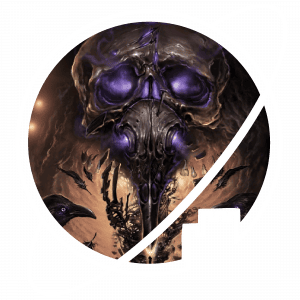
Review: Strangeland – Wormwood Studios
In this point-and-click video game, you’ll find yourself trapped in a madness-inducing cycle of death, desperation and poor jokes, chasing a golden-haired woman through a creepy world of croaking ravens and hollow laughter.
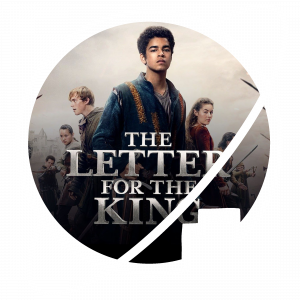
Review: The Letter for the King – Netflix
Young squire Tiuri has difficulties living up to his father’s name when it comes to the virtues required for knighthood. One night, his greatest challenge yet presents itself with a call for aid that sends him on a dangerous mission to deliver a secret letter to the king of a neighboring country. Why are people hunting this letter? And what is the significance of Tiuri’s own ancestry?
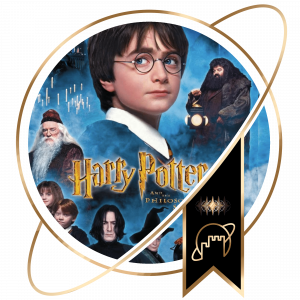
Collected: Harry Potter by J. K. Rowling
COLLECTION: Do these books even need an introduction? They are the famous story of an eleven-year-old orphan who finds out he is a wizard and becomes a student at Hogwarts School of Witchcraft and Wizardry. Seven books filled with exciting adventures await…
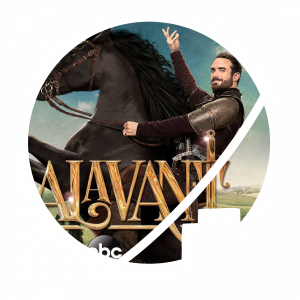
Review: Galavant – ABC
Review: Galavant is a musical comedy about a handsome yet washed up knight, who sets out on an epic adventure to win back his kidnapped lover.
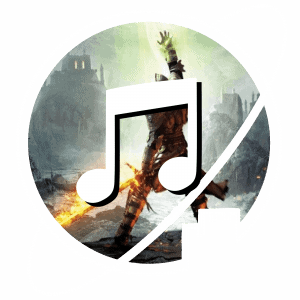
Playlist – The Inquisitor from Dragon Age Inquisition
Need something new to listen to? Why not try this playlist inspired by The Inquisitor from Dragon Age Origins, curated by Lotte?
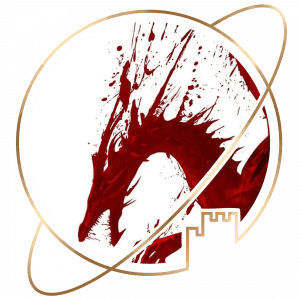
Review: Dragon Age: Origins – Bioware
Forced by circumstances to leave your old life behind, you join the Grey Wardens, an ancient order sworn to protect the world against the murderous Darkspawn. You’re the people’s only hope to stop their imminent advance. Shall you succeed?




